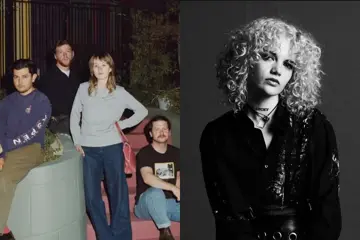The two are speaking from their respective homes in Melbourne and Brisbane, and Cromack even runs out of the room to turn his kettle off at one point, bringing to mind the time he carried a kettle full of boiling water onto the stage at Falls Festival, inside a backpack, and poured himself a cup of tea.
It was after a similar show, during the tour for Ball Park Music's third album, Puddinghead, that Coleman reached out to the lead singer with the suggestion of a collaboration. As fate would have it, Cromack was already a fan of The Cactus Channel, and they were soon making music together.
"It was refreshing how much we didn't have to discuss it," Coleman says. "We never even really sat down with some kind of mission statement."
"When I met the guys they already had songs developing," Cromack explains. "They had lots of music, and they just played while I started noodling over the top with melodic ideas. For the longest time I sang gibberish on so many of these songs. I was just busy with Ball Park stuff, or whatever other stuff, and I guess as I've gotten older I've had more and more difficulty writing lyrics for things."
"I remember seeing the press release for Sorry Hills, and there was a bit of an interpretation of the lyrics, which was not wrong, but I thought it was funny that they were having a stab in the dark."
The resulting ambiguity in the songwriting on their release, Do It For Nothing, has not only made for a compelling listening experience, but it's also created a unique situation for Coleman when performing the music. "It's been really interesting, because The Cactus Channel have done a few shows recently, and I've been singing some of these tunes with the lyrical content, so I have had this connection with them. But as a band, we haven't gone through it with Sam," he says. "It's another thing to learn about this music, even after it's recorded, which is kind of a nice thing; it's not like it's done and then that's it."
Don't miss a beat with our FREE daily newsletter
"You feel compelled to understand a song when you start to grow fond of it," Cromack adds. "We spent so much time working on the music together that unfortunately the lyrics were not really part of that. I ended up writing them right at the last minute, as I recorded the vocals, and I haven't really had the chance to hang with the guys since then. I remember seeing the press release for Sorry Hills, and there was a bit of an interpretation of the lyrics, which was not wrong, but I thought it was funny that they were having a stab in the dark," he laughs.
The process of collaboration has changed both of their songwriting, and they've since found themselves moving in new directions. "There's definitely a difference in feeling and approach," Coleman says. "I feel like we often take enthusiasm and inspiration from film music and soundtracks but are a little too excited about it, and play everything with the feeling that it gives us rather than what the actual thing is, so it comes off as quite excitable and potentially busy at times.
"I know with our earlier records it was quite frantic like that, but I've been trying to get around to making more subtle music with that cinematic feel. We're trying to be a lot lighter on things in some ways, and I think this is for the better."
Cromack experienced something similar. "I'm way less scared of having something that's really slow tempo, really spacious, and has the voice a bit more exposed. There was a couple of moments in the last Ball Park record when we were finally learning to have a little bit of chill, and I think going into The Cactus Channel thing gave me a chance to explore full amounts of chill. I really got to see my voice not necessarily as being better than I thought it was, but more versatile."
He adds that while having insane amounts of energy has always been a staple part of his music with Ball Park Music, the opportunity has allowed him and the band to see things in a new light. "You always underestimate how much you're going to learn from collaborating, and you do come off changed, in a way. I really am thankful for that, and it makes me feel like the whole thing was super worthwhile."
"That's about it," Coleman says, wrapping up our conversation. "It's a good thing, and I will be glad to perform it live."















